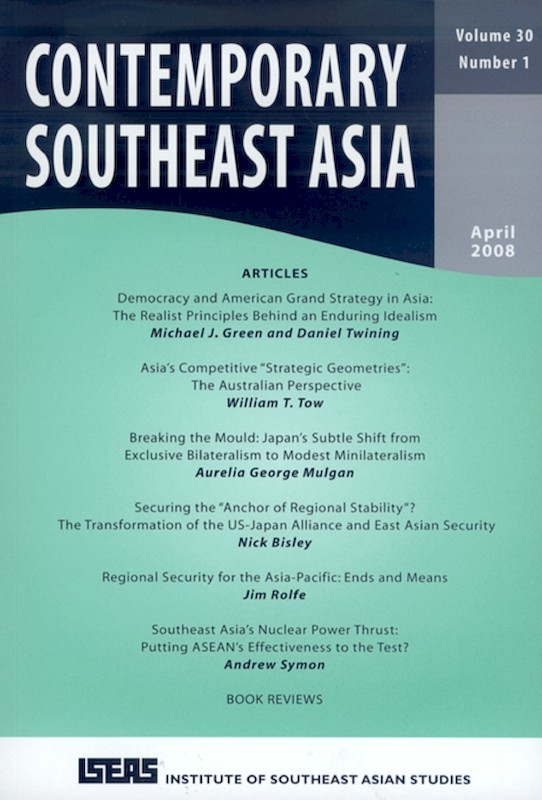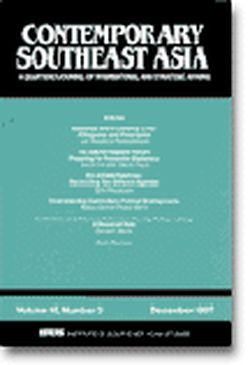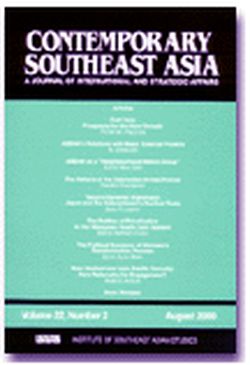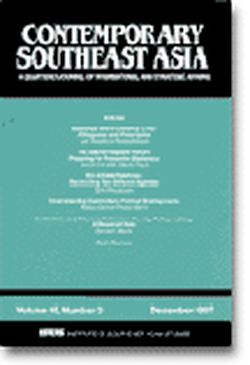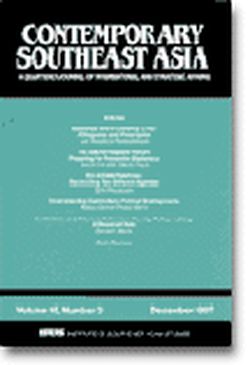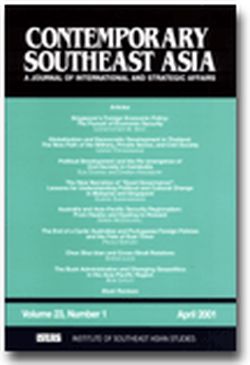Contemporary Southeast Asia: A Journal of International and Strategic Affairs Vol. 24/1 (Apr 2002)

Date of publication:
May 2002
Number of pages:
185
Code:
CS24/1
About the publication
An internationally refereed journal that specializes in the politics, international relations and security-related issues of Southeast Asia and the Asia-Pacific.
Contents
-
Contemporary Southeast Asia: A Journal of International and Strategic Affairs Vol. 24/1 (Apr 2002)
-
Preliminary pages
- ARTICLES
-
Ethno-Religious Conflicts: Rise or Decline? Recent Developments in Southeast Asia, by Peter Searle, author see abstractThe rise or decline of ethno-religious conflict in Southeast Asia will largely depend on the extent to which Indonesia, as the pivotal state in the region, is able to manage its own democratic transition. In the Indonesian case, the rise of ethno-religious conflict is inextricably linked to Indonesia's chronic ongoing national crisis -- a crisis arising, in the main, from the weakness of the state and radical decentralization that is not working well. In Indonesia, as elsewhere in Southeast Asia, ethno-religious conflict has also been spurred by the conjunction of economic and social marginalization with significant demographic change. External factors (particularly that of Islam as a potent mobilizing force both within and beyond state borders) have also exacerbated such conflict.
-
Laskar Jihad and the Political Position of Conservative Islam in Indonesia, by Michael Davis, author see abstractLaskar Jihad introduced itself to the world in April 2000, when a procession of its members marched to the presidential palace in Jakarta brandishing sabres. By the following month, two to three thousand of the group's members had travelled to Maluku (the Moluccas), in eastern Indonesia, to fight alongside local Muslims locked in a cycle of communal violence with the region's Christian population. Their intervention turned the tables in a conflict in which the Christians had previously appeared to have the upper hand. Despite widespread criticism of their response to its activities, the Indonesian authorities have so far taken little sustained action against Laskar Jihad. The group's emergence has aroused speculation on whether it heralds an expansion of the political influence of conservative Islam among the world's largest Muslim population.
-
The Continuation of Civil Unrest and Poverty in Mindanao, by Daniel Joseph Ringuet, author see abstractThis article examines the impact that civil unrest has had on Mindanao since the sixteenth century. It is argued that the ongoing unrest has largely been caused by the policies of the Philippine governments that followed the Spanish and American periods of colonization. The article focuses on the introduction of martial law in 1972, the growth of Muslim separatist movements, and the ensuing peace movements. In addition, it is recognized that the severe hardship and poverty that the people of Mindanao have endured during the last thirty years is attributable to government-backed military activities on the island.
-
Security, Development and Political Participation in Thailand: Alternative Currencies of Legitimacy, by Duncan McCargo, author see abstractThis article argues that Thailand's political elites have employed three different "currencies" in their quest for legitimacy since 1932. These "currencies" are defined as: security, development, and political accommodation or participation. Different currencies have enjoyed different degrees of salience according to prevailing domestic and international conditions. While security was a crucial legitimating rationale during the Cold War, since the economic crisis and the new constitution of 1997, political participation has loomed largest. The article examines the career of former army commander and prime minister Chavalit Yongchaiyudh, in order to illustrate the changing value of alternative sources of legitimacy from the early 1980s to the late 1990s. It argues that despite the growing importance of political participation, fundamental inequalities of power and resources persist in contemporary Thailand.
-
Challenges for Japanese Diplomacy After the End of the Cold War, by Fumitaka Furuoka, author see abstractIn the post-Cold War era when Western countries began to promote "universal values" and Asian countries proclaimed "Asian values", Japan chose the Asia-Pacific region as a main theatre for its diplomacy. In this article, Japan's efforts to strengthen diplomatic relations with Asia are seen as an attempt to establish a new in-group (uchi) with other Asian countries. Before World War II, Japan already made an attempt to expand its uchi by absorbing East Asian countries by force and brought on a self-destructive war with the West. Japan should learn from its previous mistakes to establish balanced diplomatic relations with Asia that would contribute to the prosperity of, and stability in, both Western and Asian countries.
-
Japan's Post-Cold War Security Policy: Bringing Back the Normal State, by Bhubhindar Singh, author see abstractThis article argues that Japan has incorporated a greater political dimension into its post-Cold War security, constituting a dramatic shift from its isolationist strategy of one-country pacifism during the Cold War. This change is due to both domestic and international factors. The article utilizes the concept of "normalization" to describe Japan's greater contribution to international security affairs. Japan's normalization is demonstrated by highlighting the following significant changes in its security policy: revisions to the U.S.-Japan security alliance, Japan's participation in the TMD project, the strengthening of Japan's military and intelligence-gathering capabilities, possible revisions to Japan's Peace Constitution, and Japan's bid for a permanent seat on the United Nations Security Council.
-
Vietnam-ASEAN Co-operation after the Cold War and the Continued Search for a Theoretical Framework, by Nguyen Vu Tung, author see abstractThis article seeks to analyse the strength and weaknesses of the three main international relations (IR) approaches, namely, neo-realist, liberal institutionalist, and constructivist frameworks, applied to the Vietnam-ASEAN relationship since the mid-1980s. While the making and implementation of Vietnamese foreign policy with regard to ASEAN has shown some clues congruent with both neo-realist and liberal institutionalist frameworks, the constructivist approach also seems to have become an increasingly promising one, providing additional explanations to the Vietnam-ASEAN relationship. Yet, to confirm the plausibility and superiority of any theoretical model depends to a large extent on greater efforts at gaining access to and interpreting various types of sources related to the foreign policy of Vietnam.
-
The Lessons of Le Kha Phieu: Changing Rules in Vietnamese Politics, by Zachary Abuza, author see abstractAt the Vietnam Communist Party's Ninth Congress, General Secretary Le Kha Phieu was voted out of office, heralding an end to the era of the strongman in Vietnamese politics. Phieu made many mistakes, including being politically corrupt, campaigning openly, abusing power, and equivocating on important economic decisions. However, these alone were not enough to unseat him. Phieu's downfall must be explained by systemic changes in the Vietnamese political system, including his status as a compromise candidate with no broad base of support, and the growth of political power of provincial leaders. This article concludes by analysing newly elected leader Nong Duc Manh's ascension to office and finds that he displays none of the personal liabilities that wounded Phieu, and has taken advantage of the changed political environment to give himself a broad base of support and a mandate to lead.
-
Reconciling Multiple Economic Multilateralisms: The Case of Singapore, by Christopher M Dent, author see abstractThe Singapore state devotes a high degree of its technocratic resources to economic diplomacy activities on various fronts. As a small, open and globalized city-state economy, Singapore's prosperity is highly dependent upon the continued health and stability of the international economic system. Thus, "systemic security" objectives are afforded notable priority within the framework of Singapore's foreign economic policy (FEP). This article examines how the pursuit of such objectives is revealed through various forms of multilateral economic diplomacy. More specifically, it identifies important conflicts of interest therein, for example, in Singapore's approach to recent developments both in regional economic multilateralism in East Asia and global economic multilateralism. The Singapore state's dealings with the "value-based" issues (such as, labour and environment) embodied in the "new" or "complex" multilateralism also presents a key FEP challenge.
- BOOK REVIEWS
-
BOOK REVIEW: Indonesia's Transformation and the Stability of Southeast Asia. By Angel Rabasa and Peter Chalk, by Daljit Singh, author
-
BOOK REVIEW: Self-Determination in East Timor: The United Nations, the Ballot, and International Intervention. By Ian Martin, by Paulo Gorjao, author
-
BOOK REVIEW: The Many Faces of Asian Security. Edited by Sheldon W. Simon, by Richard Stubbs, author
-
BOOK REVIEW: Twenty-First Century World Order and the Asia-Pacific: Value Change, Exigencies, and Power Realignment. Edited by James C. Hsiung, by Kripa Sridharan, author
-
BOOK REVIEW: Soldiers of Fortune: The Rise and Fall of the Chinese Military-Business Complex, 1978-1998. By James Mulvenon, by Joseph Fewsmith, author

